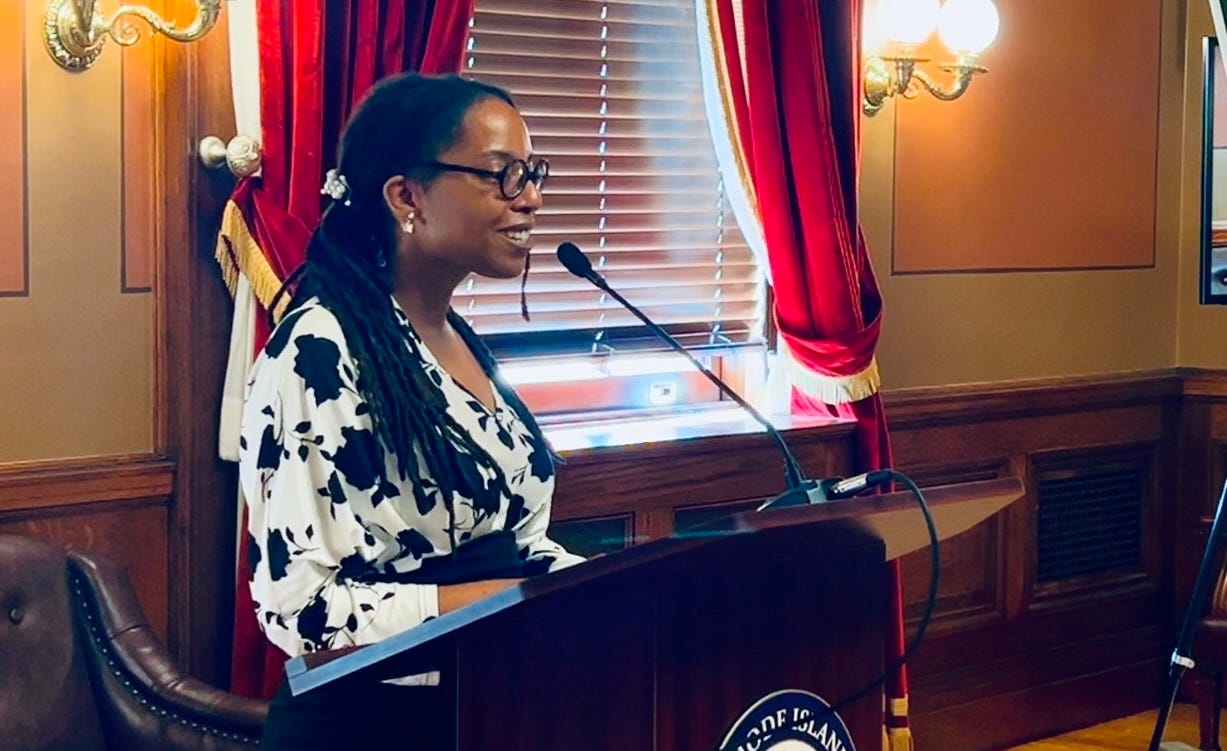Will the General Assembly ensure the promise of the Rhode Island Cannabis Act?
May 13, 2025
“Cannabis taxes are going somewhere,” said Zara Salmon. “They could continue to line the pockets of the rich, or be strategically used to benefit low-income communities.”
“Many Rhode Islanders ask, ‘I’m not in the cannabis industry. How is this going to impact me?’” said Zara Salmon, co-founder of the Cannabis Policy Coalition, an advocacy group composed of small business owners, entrepreneurs, advocates, and legislators dedicated to equitable and just cannabis policies that prioritize the interests of communities disproportionately affected by cannabis prohibition. “It’s going to impact you no matter what. Cannabis taxes are going somewhere. They could continue to line the pockets of the rich, or be strategically used to benefit low-income communities, as outlined by the Cannabis Control Commission. Those communities would be Central Falls, Providence, Newport, Woonsocket, and Pawtucket. We could have a fund flowing into low-income communities in perpetuity, improving our education, housing, and healthcare, or we could have it line the pockets of the rich. Today, we have the potential to make change happen for a lasting time.”
Salmon was speaking at last week’s press conference in support of legislation (H5829/S0531), sponsored by Representative Leonela Felix (Democrat, District 61, Pawtucket) and Senator Jonathan Acosta (Democrat, District 16, Central Falls, Pawtucket) that would modify the Rhode Island Cannabis Act and reinvest revenue from the state cannabis industry into communities disproportionately impacted by the prohibition of cannabis and the war on drugs.
“It’s been one of the greatest honors of my time in the General Assembly to work on cannabis policy,” said Senator Jonathan Acosta (Democrat, District 16, Central Falls, Pawtucket). “We passed one of the most progressive and best-designed cannabis legalization bills that we’ve seen, but, as is often said in this building, there is no such thing as a perfect bill. This year’s legislation tries to further improve an imperfect policy by helping to right some of the wrongs committed in our communities over the decades by a drug policy that criminalized people unnecessarily and uselessly.”
The legislation would allocate 50 percent of the cannabis excise tax revenue toward improving social equity and supporting communities impacted by the prohibition of cannabis and the war on drugs. It would establish a disproportionately impacted areas investment fund to help these historically marginalized communities by funding public housing, public education, and health subsidies. Twenty-five percent of the cannabis excise tax would be directed to this fund for the first five years, with the remaining 75 percent going toward the existing social equity fund for technical assistance and grants for members of disproportionately impacted communities getting started in the cannabis industry. After five years, these two funds would split their allocation evenly.
“Scholars have long proven that the war on drugs has been waged disproportionately against Black and Latino communities,” said Hector Perez-Aponte, policy analyst at the Economic Progress Institute. “A 2020 report from the American Civil Liberties Union showed that Black people in Rhode Island were 3.3 times more likely than white people to be arrested for marijuana possession despite comparable marijuana usage among the two racial groups. The racial disparities were even more pronounced and way above the national average outside Providence County.
“While significant progress has been made by decriminalizing and then legalizing marijuana, much more needs to be done to address the widespread financial harm caused by the disproportionate enforcement of marijuana and other drug laws,” continued Perez-Aponte. “Failure to allocate some of the cannabis revenue toward Black and Latino communities harmed by the war on drugs would be tantamount to compounding the racial harm caused by that failed initiative. That is unacceptable. At a time when efforts to make policies more equitable are under attack across the nation, Rhode Island needs to stand strong and renew our dedication to equity and fairness.”
When Rhode Island legalized adult recreational cannabis in 2022, the legislation reserved one license in each of the six state districts for a social equity licensee. To ensure that applicants have close ties to a community impacted by the war on drugs, the bill would also tighten up the definition of these applicants. Someone could qualify as a social equity applicant if they have resided for five of the last 10 years in a disproportionately impacted area; this bill changes that to the previous five years continuously.
The bill also amends the statute to make clear that no one will be disqualified from participating in the legal cannabis business due to a prior conviction of cannabis possession unless that crime involved distribution to a minor.
“The UFCW is working to support the development of the six worker-owned cooperative dispensaries that have protected access to regional businesses through the Rhode Island Cannabis Act,” said United Food and Commercial Workers organizer Emma Karnes. “We are excited about this opportunity to build a worker-centric market that doesn’t exist anywhere else in the country and is owned by workers. We believe very strongly that these cooperative dispensaries should be owned and governed by working Rhode Islanders, especially those who have been impacted by the criminalization of cannabis. These cooperatives should exert control over what this industry looks like in Rhode Island, and provide meaningful, robust opportunities to build wealth for the people who work every day in these dispensaries, show up in the morning, sell you your weed, and keep the market running.
“Building a worker and community-owned economy feels like swimming against the current,” continued Karnes. “It takes concerted organizing and upfront investment to make this happen, especially in cannabis, where there are extremely high capital barriers to entry. We estimate that to start a dispensary in Rhode Island from scratch costs about a million dollars. That is hard money to come by if you are working an hourly job in a dispensary, and you don’t have access to the traditional sources of startup capital that are available to entrepreneurs because of the ongoing criminalization of cannabis at the federal level. That is why this legislation is so very important.”
Right now, noted Karnes, the social equity fund created by the Rhode Island Cannabis Act is severely underfunded and has nowhere near enough money to support the six to 12 social equity and worker-owned cooperative businesses called for in the legislation, let alone implement the workforce development and restorative justice programming the legislation calls for.
“We need investment from the state,” concluded Karnes. “We need investment from the lawmakers who opened the door to social equity and worker ownership when they passed the Rhode Island Cannabis Act three years ago. We are doing the grassroots organizing. We are bringing workers and customers into this vision of a deeply equitable economy, but that economy will not be realized without funding from the state. We can have an equitable and transparently accessible economy in cannabis. That’s what the Rhode Island Cannabis Act promises, and we’re almost to the finish line. We need support from the state to make that happen.”
Representatives David Morales (Democrat, District 7, Providence) and Cheri Cruz (Democrat, District 58, Pawtucket) also spoke at the press conference.
Here’the video:
Search
RECENT PRESS RELEASES
Related Post





